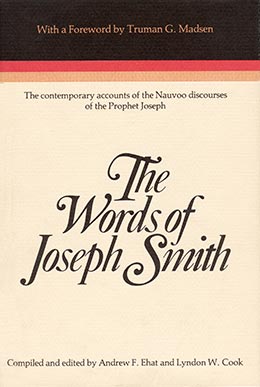7 April 1842 (Thursday Afternoon). Grove
Times and Seasons 3 (15 April 1842): 761-63[1]
Conference met, Pres't. Joseph Smith had the several quorums put in order, and seated: [2] he then made some very appropriate remarks concerning the duties of the church, the necessity of unity of purpose in regard to the building of the houses, [3] and the blessings connected with doing the will of God; and the inconsistency folly and danger of murmuring against the dispensations of Jehovah.
He said that the principal object of the meeting was to bring the case of Elder Page before them, and that another object was to choose young men, and ordain them, and send them out to preach, that they may have an opportunity of proving themselves, and of enduring the tarring and feathering and such things as those of us who have gone before them, have had to endure.
… Pres't. J. Smith then arose and stated that it was wrong to make the covenant referred to by him; [4] that it created a lack of confidence for two men to covenant to reveal all acts of secrecy or otherwise to each other—and Elder Page showed a little grannyism. He said that no two men when they agreed to go together ought to separate, that the prophets of old would not and quoted the circumstance of Elijah and Elisha iii Kings 2 chap. when about to go to Gilgal, also when about to go to Jericho, and to Jordan, that Elisha could not get clear of Elijah, that he clung to his garment until he was taken to heaven and that Elder Page should have stuck by Elder Hyde, and he might have gone to Jerusalem, that there is nothing very bad in it, but by the experience let us profit; again, the Lord made use of Elder Page as a scape goat to procure funds for Elder Hyde.
… Pres't. J. Smith spoke upon the subject of the stories respecting Elder Kimball and others, showing the folly and inconsistency of spending any time in conversing about such stories or hearkening to them, for there is no person that is acquainted with our principles would believe such lies, except Sharp [5] the editor of the "Warsaw Signal." Baptisms for the dead, and for the healing of the body must be in the font, those coming into the church and those rebaptized [6] may be done in the river.
A box should be prepared for the use of the font, that the clerk may be paid, and a book procured by the monies to be put therein by those baptized, the remainder to go to the use of the Temple.
Wilford Woodruff Diary
Rainy in the fore part of the day conferance opened at 1 oclock President J. Smith H. Smith Wm Law & the Twelve took the stand & opened meeting & spoke upon a variety of subjects & called upon those who wished to be ordained to the office of an Elder to come forward & have their names taken many came forward.
—7 April 1842
Notes
[1] See History of the Church, 4:583-86. Not in Teachings. The source for the History of the Church entry is the Times and Seasons account. The following remarks were made by the Prophet at the April 1842 General Conference of the Church. Wilford Woodruff's report is here published for the first time.
[2] That is, the priesthood quorums sat in order according to the gradations of offices in the priesthood.
[3] Namely, the Nauvoo Temple and the Nauvoo House.
[4] The text refers to repeated covenants made by Orson Hyde and John E. Page relative to their mission to Jerusalem. They covenanted to "stand by each other while on the mission; that if they were insulted, or imposed upon they would stand by each other even unto death, and not separate unless to go a few miles to preach a sermon; that all monies should go into one purse" (Times and Seasons 3 [15 April 1842]: 761-62).
[5] Thomas Coke Sharp (1814-94), a native of New Jersey, was the most feared and hated anti-Mormon in Illinois. Trained as a lawyer, Sharp was editor of the rabid anti-Mormon Warsaw Signal.
[6] Concerning the use of the baptismal font for rebaptisms and the healing of the body, see D. Michael Quinn, "The Practice of Rebaptism at Nauvoo," Brigham Young University Studies 18 (Winter 1978): 226-32.
